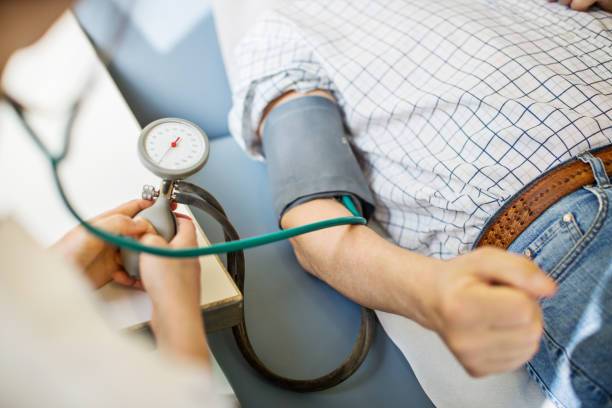High blood pressure, also known as hypertension, is one of
the most common yet serious health conditions affecting millions of people
worldwide. Often referred to as the "silent killer" due to its lack
of obvious symptoms, high blood pressure can lead to severe health
complications if left untreated, including heart disease, stroke, and kidney
failure. This article aims to provide a comprehensive understanding of high
blood pressure, its causes, symptoms, treatment options, and strategies for
prevention.
What is High Blood Pressure?
Blood pressure is the force exerted by circulating blood
against the walls of the arteries, which are the blood vessels responsible for
carrying oxygen-rich blood from the heart to the rest of the body. Blood
pressure readings are measured in millimeters of mercury (mmHg) and are
expressed as two numbers: systolic and diastolic pressure.
- Systolic Pressure : This is the higher number and represents
the pressure in the arteries when the heart beats.
- Diastolic Pressure : This is the lower number and indicates the
pressure in the arteries when the heart is at rest between beats.
For example, a blood pressure reading of 120/80 mmHg is
considered normal, with 120 being the systolic pressure and 80 being the diastolic
pressure. High blood pressure is generally defined as having a reading
consistently at or above 130/80 mmHg.
The Stages of High Blood Pressure
The American Heart Association classifies blood pressure
into several categories:
1. Normal Blood
Pressure : Less than 120/80 mmHg
2. Elevated Blood
Pressure : Systolic between 120-129 and
diastolic less than 80 mmHg
3. Stage 1
Hypertension : Systolic between 130-139
or diastolic between 80-89 mmHg
4. Stage 2
Hypertension : Systolic 140 mmHg or
higher, or diastolic 90 mmHg or higher
5. Hypertensive
Crisis : Systolic over 180 and/or
diastolic over 120 mmHg, which requires immediate medical attention
Causes of High Blood
Pressure.
High blood pressure can develop due to various factors,
which are broadly classified into two categories: primary (essential) hypertension and secondary hypertension .
- Primary
Hypertension : This is the most common
type, accounting for about 90-95% of cases. It develops gradually over many
years and is often linked to lifestyle factors and genetics.
- Secondary
Hypertension : This type is caused by an
underlying health condition, such as kidney disease, hormonal disorders, or the
use of certain medications (e.g., birth control pills, decongestants). It tends
to appear suddenly and may cause higher blood pressure than primary
hypertension.
d pressure include:
- Age : The risk increases as you get older.
- Family History : A family history of hypertension increases
your risk.
- Obesity : Excess weight can put additional strain on
the heart and arteries.
- Sedentary
Lifestyle : Lack of physical activity
contributes to weight gain and increased blood pressure.
- Diet : High salt intake, low potassium, and
excessive consumption of processed foods can elevate blood pressure.
- Alcohol and
Tobacco Use : Excessive drinking and
smoking are significant risk factors.
- Stress : Chronic stress can lead to temporary spikes
in blood pressure.
- Chronic Conditions : Conditions like diabetes, sleep apnea, and
high cholesterol can increase the risk of hypertension.
Symptoms of High
Blood Pressure
One of the most dangerous aspects of high blood pressure is
that it often presents no obvious symptoms until serious health complications
occur. This is why it is frequently referred to as a "silent killer."
However, in some cases, people with extremely high blood pressure may experience
symptoms such as:
- Severe headaches
- Fatigue or confusion
- Vision problems
- Chest pain
- Difficulty breathing
- Irregular heartbeat
- Blood in the urine
If you experience any of these symptoms, especially if they
are sudden and severe, it is crucial to seek medical attention immediately.
Health Complications
of High Blood Pressure
Uncontrolled high blood pressure can lead to several severe
health issues, including:
- Heart Disease : High blood pressure can damage arteries,
leading to reduced blood flow to the heart, increasing the risk of heart
attack, heart failure, and other cardiovascular diseases.
- Stroke : High blood pressure can cause blood vessels
in the brain to burst or become blocked, resulting in a stroke.
- Kidney Damage : Hypertension can damage the kidneys'
filtering units, leading to kidney failure.
- Vision Loss : High blood pressure can damage the blood
vessels in the eyes, potentially causing blindness.
- Aneurysms : The increased pressure can weaken blood
vessels, leading to the formation of aneurysms, which can be life-threatening
if they rupture.
Diagnosing High Blood
Pressure
Hypertension is usually diagnosed during routine check-ups.
A healthcare professional will use a blood pressure cuff to measure your
levels. If readings are consistently high, further tests may be recommended,
such as:
- Blood Tests : To check for underlying conditions that
could be causing hypertension.
- Urinalysis : To evaluate kidney function.
- Electrocardiogram
(ECG) : To detect heart problems.
- Echocardiogram : To check for any damage to the heart.
Treatment and
Management of High Blood Pressure.
Managing high blood pressure typically involves lifestyle
changes, medication, or a combination of both. Treatment plans are
individualized based on the severity of hypertension and the patient's overall
health.
Lifestyle Changes :
- Healthy Diet : A diet rich in fruits, vegetables, lean
proteins, and whole grains can help lower blood pressure. The DASH (Dietary
Approaches to Stop Hypertension) diet is particularly effective.
- Reduce Salt Intake : Limiting sodium intake can significantly
lower blood pressure levels.
- Regular Exercise : Engaging in physical activities like
walking, cycling, or swimming for at least 30 minutes a day can improve heart
health.
- Weight Management : Losing even a small amount of weight can
have a significant impact on blood pressure.
- Limit Alcohol and
Quit Smoking : Reducing alcohol intake
and quitting smoking can improve blood pressure and overall heart health.
- Stress Management : Techniques like meditation, yoga, and deep
breathing exercises can help reduce stress and lower blood pressure.
Medications :
For those with moderate to severe hypertension, doctors may
prescribe medications, such as:
- Diuretics : Help the body eliminate excess sodium and
water to reduce blood pressure.
- ACE Inhibitors : Relax blood vessels by preventing the
formation of a hormone that narrows blood vessels.
- Beta-blockers : Reduce heart rate and the heart's workload.
- Calcium Channel
Blockers : Relax blood vessels by
preventing calcium from entering the cells of the heart and arteries.
Preventing High Blood
Pressure
Preventive measures can help reduce the risk of developing
high blood pressure. Here are some key strategies:
- Monitor Your Blood
Pressure : Regularly checking your blood
pressure can help catch any changes early.
- Eat a Balanced
Diet : Focus on nutrient-rich foods and
limit processed and high-sodium foods.
- Stay Active : Incorporate regular physical activity into
your routine.
- Maintain a Healthy
Weight : Aim for a balanced weight based
on your age, gender, and height.
- Limit Alcohol and
Caffeine : Both can increase blood
pressure if consumed excessively.
- Manage Stress : Chronic stress contributes to high blood
pressure, so finding ways to relax is essential.
Conclusion
High blood pressure is a critical health concern that
affects millions globally. By understanding its causes, symptoms, and treatment
options, individuals can take proactive steps to manage and prevent
hypertension. Regular check-ups, a healthy lifestyle, and medication (when
necessary) are key to maintaining optimal blood pressure levels and reducing
the risk of life-threatening complications.
If you are concerned about your blood pressure, consult with
a healthcare professional for a personalized assessment and guidance on
managing your health. Remember, early detection and intervention are crucial in
the fight against this silent but deadly condition.



No comments yet
Be the first to share your thoughts!